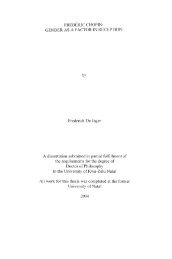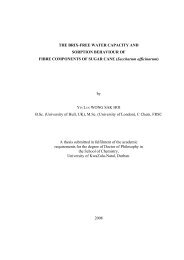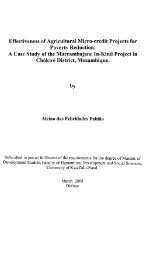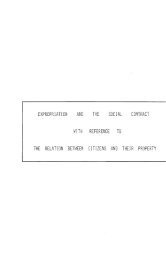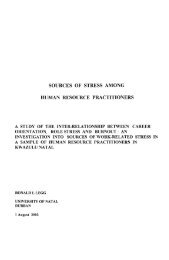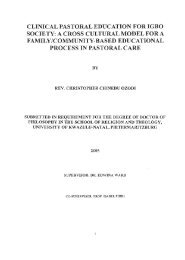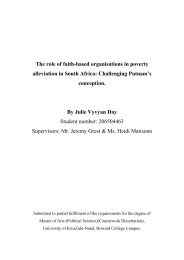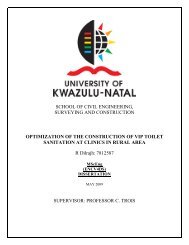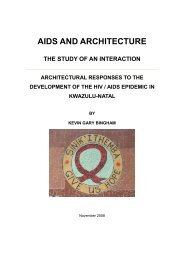View/Open - ResearchSpace - University of KwaZulu-Natal
View/Open - ResearchSpace - University of KwaZulu-Natal
View/Open - ResearchSpace - University of KwaZulu-Natal
Create successful ePaper yourself
Turn your PDF publications into a flip-book with our unique Google optimized e-Paper software.
data in greater detail by remaining conversational and situational (Ulin et al., 2002). <strong>Open</strong>-<br />
ended questions allowed two-way communication between the researcher and the participants<br />
which also allowed better exploration <strong>of</strong> themes <strong>of</strong> the study in a focused manner<br />
(Sociological research skills, 2010). These questions were designed in English and translated<br />
into IsiZulu. A short questionnaire consisting <strong>of</strong> closed-ended question was used to get the<br />
participant’s and the organisation’s demographic information (see appendix 1b). Tape<br />
recorders were used to record the data from interviews and focus group discussions.<br />
3.5.1 Semi-structured interviews with HBCCs/Project managers<br />
Ten HBCCs/project managers (one per organization) participated in semi-structured<br />
interviews. These interview sessions were held in the HBCCs’ <strong>of</strong>fices. Prior to each<br />
interview, the nature and aims <strong>of</strong> the study were explained to each participant who were then<br />
asked to fill in a short questionnaire and an informed consent form (see appendix 1a). The<br />
ethical issues that were covered in the informed consent form were also discussed verbally<br />
with the participants for purposes <strong>of</strong> clarity. Assurance <strong>of</strong> confidentiality was covered and<br />
participants were also informed that they could stop the interview at any time if they wished.<br />
Permission to use tape recorders was requested from the participants and they were assured<br />
that they would be privacy in handling and storing <strong>of</strong> the data in that, only the researcher and<br />
the supervisor would have access to the data.<br />
Semi-structured interviews with HBC coordinators were appropriate in this research because<br />
they allowed and encouraged respondents to give in-depth information as well as their<br />
personal opinions on infection control practices in HBCOs rather than presenting participants<br />
with rigid pre-set questions that could have limited the data that was collected. These semi-<br />
structured interviews were also useful because HBCCs were in a better position to provide<br />
relevant information because they had the responsibility <strong>of</strong> overseeing HBC programs in their<br />
organisations. The research interviews were conducted in English using an interview<br />
schedule with open- ended questions (see appendix 2). In instances where participants could<br />
not express themselves in English, interviews were conducted in IsiZulu language by the<br />
facilitator and they were guided by an interview schedule in the Zulu version (see appendix<br />
2). The themes that were covered in the interview schedule were: perceptions <strong>of</strong> infection<br />
33



